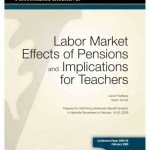Labor Market Effects of Pensions and Implications for Teachers
 While the pension plan landscape has changed remarkably over the last two decades, with most private-sector workers seeing a shift from defined benefit (DB) to defined contribution (DC) plans, DB pension plans remain the overwhelming norm for K-12 teachers employed by state and local governments. With DB plans, teachers typically receive minimal pension benefits if they leave their jobs before their fifties, then large gains for staying a few more years, after which their pension wealth begins to drain away if they do not retire. The resulting jumps and dips in the path of teacher pension wealth accrual have major implications for the staffing of schools, potentially affecting retirement behavior, the mobility of mid-career teachers, and the characteristics of remaining teachers. Beyond describing the aging of the teacher labor force and the parameters of teacher pensions, this paper outlines lessons from the labor economics literature about the likely implications for teacher labor markets.
While the pension plan landscape has changed remarkably over the last two decades, with most private-sector workers seeing a shift from defined benefit (DB) to defined contribution (DC) plans, DB pension plans remain the overwhelming norm for K-12 teachers employed by state and local governments. With DB plans, teachers typically receive minimal pension benefits if they leave their jobs before their fifties, then large gains for staying a few more years, after which their pension wealth begins to drain away if they do not retire. The resulting jumps and dips in the path of teacher pension wealth accrual have major implications for the staffing of schools, potentially affecting retirement behavior, the mobility of mid-career teachers, and the characteristics of remaining teachers. Beyond describing the aging of the teacher labor force and the parameters of teacher pensions, this paper outlines lessons from the labor economics literature about the likely implications for teacher labor markets.
To read this paper, please click here.
Connect with Vanderbilt
©2026 Vanderbilt University ·
Site Development: University Web Communications